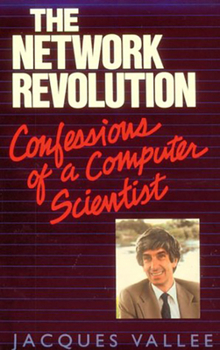The Network Revolution: A Celebration
1982 1st Ed And/Or Press 10 9 8 7 6 5 4 3 2 1 This description may be from another edition of this product.
Format:Paperback
Language:English
ISBN:091590473X
ISBN13:9780915904730
Release Date:July 1993
Publisher:Ronin Publishing (CA)
Length:210 Pages
Weight:0.69 lbs.
Dimensions:5.3" x 8.3"
Customer Reviews
1 rating
Computer history: A contemporary view on the future
Published by Thriftbooks.com User , 26 years ago
In the early 1990's, when the Internet was about to be discovered by mainstream media, I found this book (then already ten years old) in a friend's bookshelf. I started reading a chapter about some `Midnight Irregulars' and immediately recognized what the author was describing - it was the friendly computer network environment of the early 80's, when the event of the user `guest' logging in from a remote site didn't automatically trigger every alarm bell at the computer center, but was rather seen as a manifestation of innocent curiosity.That was enough for me to want to read the whole book. The author, a Frenchman working as something of a computer consultant in the USA, relates his experiences from twenty years of interaction with computer users, at a time when they were probably a lot fewer than a million worldwide. His choice of subject may seem narrow to the general reader, but the book gave me a nostalgic kick, reminding me of my own feelings with regard to thi! s environment back around 1980.Although covering approximately the same timespan as Steven Levy in `Hackers: Heroes of the Computer Revolution', Vallee mentions the hackers only in passing. Still, he manages to describe many features of the hacker culture, but from the perspective of a scientist and casual witness."Computer scientists have documented everything except their own work" Vallee claims, and then tries to fill a few gaps. While nowhere near a complete work on the history of computing, this book provides a number of revealing snapshots from places and events remembered by few today, told in an entertaining manner. The reader gets to learn about a French 1970's neo-luddite movement for the destruction of computers, about the endless discussions between French and American delegations on the standardization of computer terminology, and about a nun with a pretty sophisticated idea on the ergonomic design of desktop video terminals.With this history! as background, the author goes on to make a number of pred! ictions about the future, some of which seem remarkably accurate today. Our hardware may be thousands of times faster, but have we really made any significant progress since this book was written? Those who fail to learn the lessons of computer history are doomed to be stuck in an infinite loop.If you worked with mainframe computers in the academic environment before 1984, this book is for you. Others may enjoy it too.






